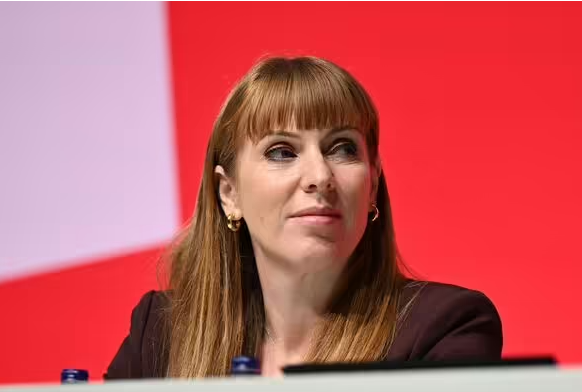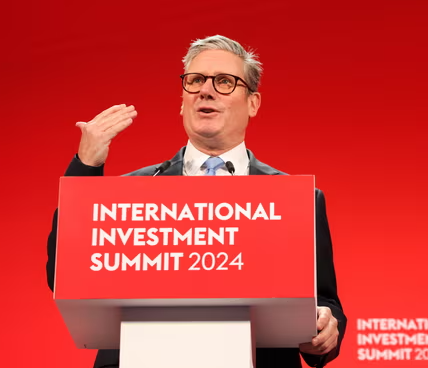Deputy PM also says people ‘will have a better life’ within five years in interview with the Guardian
Keir Starmer’s popularity ratings will bounce back, the deputy prime minister has insisted, saying the government would deliver material improvements to people’s lives over the next five years.
Angela Rayner said the prime minister had been underestimated before but predicted he would become more popular as the impact of the changes Labour was introducing began to be felt.
“I think he’ll be remembered as somebody who fixed the foundations,” she told the Guardian in her first interview since Labour’s landslide election victory. “Public service is not about being popular, it’s about being responsible more than anything. That’s more important.”
The government is trying to refocus attention on its plans before the Labour party’s annual conference in Liverpool, which begins on Saturday, but it has struggled to get back on the front foot amid damaging rows over salaries, freebies and fractious relationships in No 10.

Rayner is writing to all 12 metro mayors in England to instruct them to draw up local plans to help boost long-term growth in their regions, at the same time bringing much needed improvement in areas including housing, transport and skills.
As local government secretary she will publish a white paper next month that will give extra powers to mayors including Sadiq Khan in London, Andy Burnham in Greater Manchester and Ben Houchen, the Tory mayor for Tees Valley, including potentially raising more of their own funds.
“We’re going to make sure they’ve got all the ingredients to thrive because … where you put power with people with skin in the game, you can truly deliver,” she said.
“My ambition is to have more powers and to have more mayors … I’m not going to force people to have a mayor but I do want to see more, and deeper powers for those areas.”
More fiscal devolution, however, would be contingent on each mayoral deal. “Where they’re financially prudent and competent and exercising that through their growth plans and their visions for their areas, we want them to be able to have more control over how they spend that money.”
Rayner predicted that the public, hungry for change after voting Labour into power with a huge parliamentary majority of 174, would understand they would have to wait for transformational change to the country.
But only, she added, if the government could explain why it needed time to “fix the foundations” first as a result of the poor economic inheritance from the Conservatives.

“Now that’s not glamorous, you can’t stick that on the side of a bus, because these are fundamental, foundational changes,” she said. “You have to level with people where we’re at, because people have to understand you can only work with what you’ve got.”
After weeks of criticism of Starmer over his gloomy approach to the economy and the state of the country, Rayner offered hope that Labour would be able to start to turn things around before the next election.
“Within five years, people will have a better life. We won’t be able to fix everything immediately, but you will see the sprigs and the difference that the Labour government has made,” she said.
“Keir is really serious about saying: ‘I will never play fast and loose with the public finances because actually, whether it makes me popular or not, I will do what is in the public interest to fix the problem’.”
Rayner batted away suggestions that Starmer would be thrown off course by internal rows among Downing Street staff, which cabinet ministers have said risk undermining the government.
“I’m in there all the time, I just don’t see the caricature,” she said. Rayner is said to value the advice and experience of Sue Gray, Starmer’s embattled chief of staff and the subject of the most bitter briefings.
after newsletter promotion
She also denied reports she was upset that the chancellor, Rachel Reeves, had been given the use of Dorneywood, the grace-and-favour mansion usually reserved for the second-most senior minister in government.
“Rachel wanted Dorneywood, I’m happy for Rachel to be using it. It was never an issue … I’m sure Rachel will let me go and visit Dorneywood if I want to. The idea that we’re going around fighting about mansions or whatever else … ”
Rayner defended ministers for accepting freebies after the prime minister was embroiled in a row for declaring more free tickets and gifts than other major party leaders in recent times, with his total now topping £100,000, including clothes donated to his wife, Victoria.
“Keir declared it which is how the story arose … putting the record straight was the important thing. I do think the rules matter,” she said. “Look, the donations rules apply to all of us. Keir is really clear that you have to disclose when you’ve had donations.”
It emerged on Friday evening that Starmer, Reeves and Rayner would no longer accept free gifts of clothes following the outcry about donations.
Rayner is looking to head off another potentially damaging row at conference on the government’s plans for workers’ rights, and will meet trade union leaders on Saturday to thrash out the package.
She insisted there wasn’t “a Rizla paper” between her and Jonathan Reynolds, the business secretary, over plans for longer probation periods for new workers.
She said they had reached a “sweet spot”, which is believed to be six months, longer than she had hoped for, but the Treasury is thought to have intervened.
Rayner, who is also responsible for delivering Labour’s target to build 1.5m new homes by the end of the parliament, described herself as a “yimby” on a national level because she had reimposed local house-building targets.
She understood “legitimate” concerns among local people who opposed more development, sometimes called nimbys, about getting sufficient infrastructure in place and did not want to upset them unnecessarily.
But she added that “you can’t please everybody all of the time”, and was not opposed to calling in big projects that had been blocked by local authorities if she had to.


